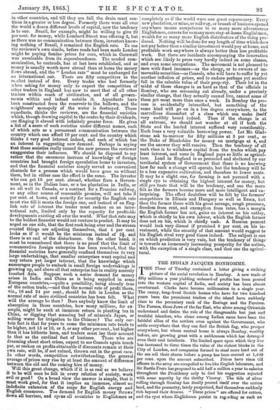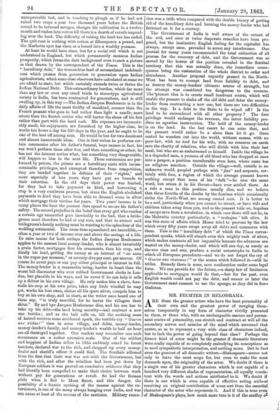THE INDIAN JACQUES BONHOMME.
THE Times of Tuesday contained a letter giving a striking picture of the social revolution in Bombay. A new trade of fifty millions a year yielding unheard-of profits has been poured into the western capital of India, and society has been almost overturned. Clerks have become millionaires in a single year. The canny, long-lived Scotch houses who have for two hundred years been the prominent traders of the island have suddenly risen to the pecuniary rank of the Barings and the Pereires. The Parsees, those Jews of the far East, who alone among Orientals understand and desire the rule of the disagreeable but just and truthful islanders, who alone among Indian races have been the faithful allies of the settlers even against the Government, who settle everywhere that they can find the British flag, who prosper everywhere, but whose central home is always Bombay, wealthy before, are growing great with a suddenness which has deranged even their cool intellects. The limited space upon which they live has increased to three times the value of the richest blocks in the City of London, and companies formed to steal more land out of the sea sell their shares before a pump has been erected at 1,400 per cent. upon the amount subscribed. Prices have risen till officers in the army are compelled to live like English labourers, and SirBartle Frere has proposed to add half a million a year to salaries throughout the Presidency only to find his suggestion rejected with some asperity by the thrifty Viceroy. The tide of silver rolling through Bombay has finally poured itself over the cotton land, and the peasantry, lately pauperized, find themselves suddenly rich beyond their dreams. " Three prices " are offered for cotton, and the ryot whom Englishmen persist in regarding as such an
unimprovable fool, and in teaching to plough as if he had not raised two crops a year two thousand years before the British ceased to be tattooed savages, changes his cultivation in a twelve- month and rushes into cotton till there is a dearth of cereals impend- ing over the land. The difficulty of raising the land-tax has ended. The quit-rent is nothing with cotton at fifteenpence a pound, and the Marhatta ryot has risen at a bound into a wealthy yeoman.
At least he would have risen, but for a social evil which is not understood in England, but which permanently menaces Indian prosperity, which forms the dark background even to such a picture as that, drawn by the correspondent of the Times. This is the " hereditary debt," the tremendous load of accumulated indebted- ness which presses from generation to generation upon Indian agriculturists, which some close observers have calculated at sums we are afraid to state, but which certainly exceeds twice or thrice the Indian National Debt. This extraordinary burden, which far more than any law or even any creed tends to stereotype agricultural society in India, has been contracted for generations, and is still swelling up, in this way :—The Indian Jacques Bonhomme is in the daily affairs of life the most thrifty of mankind, meaner than the French peasant who goes to bed rather than light a candle, more astute than the Scotch cottier who will barter the shoes off his feet rather than part with the hard cash. His expenses are inconceiv- ably small, his enjoyments are furnished by the higher class, he works ten hours a day for 330 days in the year, and he ought to be one of the best off among men. He would be but for two dominant and almost immoveable ideas. One is that unless he performs cer- tain ceremonies after his father's funeral, buys masses in fact, his son won't perform them after him, and then something or other, he has not the faintest notion what, but something very disagreeable, will happen to him in the next life. These ceremonies are per- formed by priests, the priests are a hereditary caste with incom- municable privileges, and exempted therefore from competition, they are banded together in defence of their " rights," and more especially of late years they have put no bounds to their extortion. In the old days their power was limited, for they had to take payment in kind, and borrowing a crop is a very cumbrous process, but since the English abolished payments in kind they have been able to demand sums in silver which mortgage their victims for years. Two years' income is in many places the least the peasant dare spend to secure his father's safety. The second prejudice is the belief that every girl who reaches a certain age unmarried goes inevitably to the bad, that a bride- groom must therefore be had at any cost, and that to attract said bridegroom's family nothing must be wanting to the splendour of the wedding ceremonial. The sums thus squandered are incredible,— often a year or two of income over and above the savings of a life. To raise means for both outlays the Indian Jacques Bonhomme applies to the nearest local money-lender, who is almost invariably a grain factor, mortgages first his ornaments, then his crop, and finally, his land, getting the money at an interest of "an anna in the rupee per mensem," or seventy-five per cent. per annum. Of course he never pays or can pay either principal or interest in full. The money-lender is a reasonable being, harder in heart than the worst bill discounter who ever robbed Government clerks in Lon- don, but placable in his ways, and he never if he can help it sells up a debtor in his own village. He only makes him a slave, fore- stalls his crop at his own price, takes any little windfall he may get, works his beat oxen, claims all his spare silver, compels him to buy at his own shop, and in short, as the writer once heard one of them say, " is truly merciful, for he leaves the villagers their skins " By and bye Jacques Bonhomme dies, and his son has to take up his debt—the land being security—and contract a new one besides ; and so the ball rolls on, till the seething mass of hatred receives some accidental spark, the terrible cry " Guerra aux riches ! " rises in some village, and debts, money-lender, money-lender's family, and money-lender's wealth in half an hour are all destroyed together. Our readers may remember one such occurrence on a rather extensive scale. One of the mildest and happiest of Indian tribes in 1855 suddenly seized its forest hatchets, declared war to the rich, and chopped up every money- dealer and sheriff's officer it could find. The Sonthals affirmed from the first that their war was not with the Government, but with the rich, and after the rebellion had been put down by European soldiers it was proved on conclusive evidence that they had literally been compelled to make their choice between work without pay for generations or revolt. So had the Roman plebs when it fled to Mons Sacer, and this danger, the possibility of a frantic uprising of the masses against the ex- tortioners, is one of the many always hanging over India, and was one cause at least of the success of the mutinies. Military execu-
tion was a trifle when compared with the double luxury of getting rid of the hereditary debt and burning the money-lender who had fattened on it for a century.
The Government of India is well aware of the extent of the evil, and once or twice desperate remedies have been pro- posed, but the instinctive English feeling for the capitalist has always, except once, prevailed to arrest any interference. One journal for many years recommended the total extinction of all process for the recovery of debt, and the Government was so moved by the horror of the position revealed in the Sonthal territory that this was actually done, the immediate conse- quence being the restoration of the whole district to order and abundance. Another proposal urgently pressed in the North- West has been to exempt land from liability to debt, and so destroy the money-lenders' ultimate source of strength, but the attempt was considered too dangerous to the revenue. The 'present idea is to create small insolvent courts, which will enable the peasant to shake off the old debt and deter the money- lender from contracting a new one, but there are two difficulties in the way.' Is a debt to the State to be wiped off? Is the land to be surrendered with all other property ? The first privilege would endanger the revenue, the latter liability pro- duce an agrarian insurrection. The hold of the money-lender is on the land. In the last resort he can seize that, and the peasant would rather be a slave than let it go. Once ousted he wanders out into the world, without means, with no poor-law, with no roof for his wife, with no resource on earth save the charity of relatives, who will divide with him their last meal, but who are as embarrassed as himself. Inside the village he is a degraded man, a yeoman of old blood who has dropped at once into a pauper, a position unendurable even here, where caste has no religious sanction. Outside the village—well, outside is an unknown world, peopled perhaps with "jinn" and serpents, cer- tainly with foes, a region of which the average peasant knows nothing except that none of his "folk "—he uses the same word, but utters it in his throat—have ever settled there. As a rule a man in this position usually dies, and we believe that three-fourths of the deaths by the famines which occasionally strike the North-West are among ousted men. It is better to be a serf, particularly when you cannot be struck, or have wife and children taken away from you, and so the peasant toils on, hopeless of escape save from a revolution, in which case there will not be, in the Mahratta country particularly, a " mu.hajun " left alive. It was this state of affairs which Moses tried to prevent by the law which every fifty years swept away all debts and commerce with them. This is the " hereditary debt " of which the Times corres- pondent speaks, which will absorb even this mighty rush of silver, which makes contracts all but impossible because the advances are wasted on the money-dealer, and which will one day, as surely as the sun rises and sets, produce a social catastrophe in India to which all European precedents—and we do not forget the cry of " Guerre aux chateaux ! " or the scenes which followed it—will be trifles. Remedy there is none, save confiscation under some legal form. We can provide for the future,—a sharp law of limitation applicable to mortgages would do that,—but for the past, even English wealth could not pay the debt, and sooner or later the Government must consent to use the sponge, as they did in Son. thalistan.

































 Previous page
Previous page